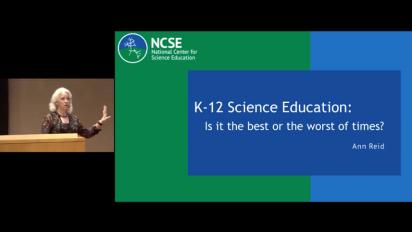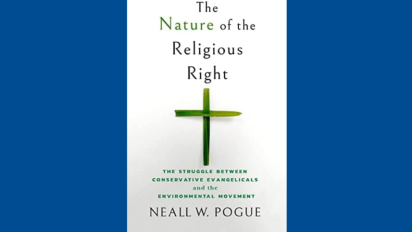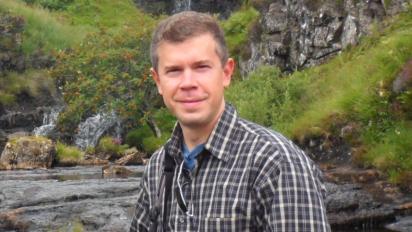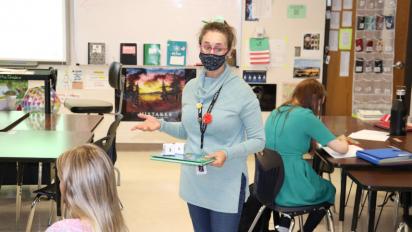NCSE goes to Washington
NCSE Executive Director Ann Reid organized a half-day forum at a recent American Association for the Advancement of Science policy forum to help policymakers better understand what it will take to improve K-12 science education.
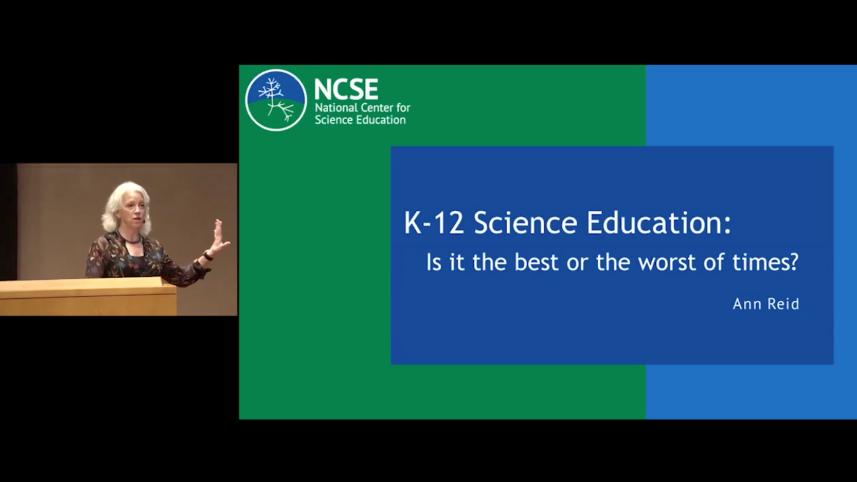
NCSE Executive Director Ann Reid presents at the December 2022 American Association for the Advancement of Science (AAAS) Committee on Science, Engineering and Public Policy (COSEPP) forum. Photo courtesy of AAAS.
Despite the prominence of the word “national” in NCSE’s name, we spend relatively little time in our nation’s capital. After all, K–12 science education is not only delivered, but also largely managed and regulated, at the local level, so we focus on teachers, districts, and states, not national policymakers.
But there are exceptions!
I have served for the last five years on the American Association for the Advancement of Science (AAAS) Committee on Science, Engineering and Public Policy (COSEPP). (It wouldn’t be Washington if there weren’t lots of acronyms!) COSEPP is composed of experts on topics ranging from the national security implications of scientific and technological research, through how research funding can be more efficiently and equitably distributed, to the potential ethical and privacy impacts of new technologies. The overall role of the committee is to advise the AAAS — the nation’s largest scientific professional society, with over 120,000 members — on policy issues. To that end, it has organized an annual forum on science and technology policy for the last 47 years. The forum is attended by hundreds of science policymakers, representing federal agencies, congressional offices, think tanks, media organizations, and advocacy groups, in Washington DC and beyond.
While my COSEPP colleagues all understand the importance of K–12 science education, and appreciate NCSE’s long-time role in defending the integrity of the science classroom, K–12 science education never seemed like a great fit for the national-policy-focused science and technology policy forum.
Nevertheless, for the past several years, I consistently urged to my COSEPP colleagues that the issue of K–12 science education deserved more attention. (It’s possible that I was just the teensiest bit obsessive about the subject.) Finally, COSEPP this year invited me to put my money where my mouth is and take responsibility for organizing a half-day session at the 2022 forum. Furthermore, they invited me to give the keynote address.
I really had one big idea in mind. I wanted to push back on the suggestion you are most likely to hear from virtually any scientist or policymaker when asked how to improve K–12 science education, which is: “Science teachers should do a better job teaching science.” (There are a number of variations on this theme: Teachers should avoid assignments that involve rote memorization, They shouldn’t just teach to the test, They should provide more hands-on activities, etc. You get the idea.) The implication is that the problem is with science teachers and that the solution is to tell them what to do.
[I]t’s time to move beyond the idea that the problem with science education is the teachers and instead embrace the notion that teachers are a big part of the solution.
Well, at NCSE, we know that just telling teachers to do better is not a solution. Teachers are embedded within complex systems of state policies, standards, and testing systems that greatly constrain their options. The complexity of the systems in which teachers are embedded is the main theme I wanted to convey during our session.
When I first started at NCSE, I labored under the same misconception that the solution is to tell science teachers to do better. What I realized is that if we really want teachers to cover evolution and climate change better, they need support: support both to gain mastery of the content and to learn how to address misconceptions that students bring into the classroom. That’s why we now provide professional development that gives teachers not only a solid grounding in the science of evolution and climate change but also sets of lessons they can use in their classrooms that allow students to overcome their misconceptions about the topics. So I decided to share NCSE’s approach with the forum audience of policymakers. But rather than simply delivering a talk about it, I took the opportunity to use the same methods we recommend for teachers with the audience. Which is to say that I, along with NCSE’s amazing teacher support staff and teacher ambassadors, sought to engage the audience with the evidence about K–12 science teaching in order to dismantle their misconceptions about it, especially the idea that the solution is just to tell science teachers to do better.
We tackled this misconception in three steps.
First, in my keynote address, I invited the audience to consider the ample evidence that the science teaching research community has amassed about the best way to teach science. Effective science teaching should help students acquire content knowledge not through memorization and lecture, but by asking questions, gathering evidence using the techniques scientists use, discussing their findings, and asking more questions. Furthermore, students should be encouraged to recognize concepts that recur in science such as patterns, cause and effect, and the interrelationship of structure and function.
The science education research community has not only demonstrated the effectiveness of this approach, it has succeeded in enshrining these principles in a model set of science standards — the Next Generation Science Standards — that have been adopted by 20 states (plus the District of Columbia). (A further 25 states have adopted state science standards that are based on the same fundamental pedagogical practices.)
That’s the good news. We know how to do science education right, and the standards are in place to support it.
Sadly, I then had to share the bad news. Powerful as it is, teaching in accordance with the NGSS framework is hard! it requires most teachers to radically rethink how they teach and totally overhaul their beloved lesson plans.
It should be clear that teachers simply cannot be expected to make all those changes without significant professional development, extra preparation time, a robust supply budget, and ongoing mentorship. At present, few states provide the resources to make that happen. Even more discouragingly, this approach to teaching science is not consistently being taught to pre-service science teachers.
Resources are lacking, but so are incentives. Once teachers have mastered the new approach, they are not paid more or promoted more quickly. By the same token, teachers who stick to the old ways face no consequences so long as their students continue to do well on standardized tests, which generally reward rote learning.
In my keynote address, I did my best to describe what great science teaching looks like, but we all know that the best way to learn is to experience, so after my presentation, we prepared to knock the audience off their feet.
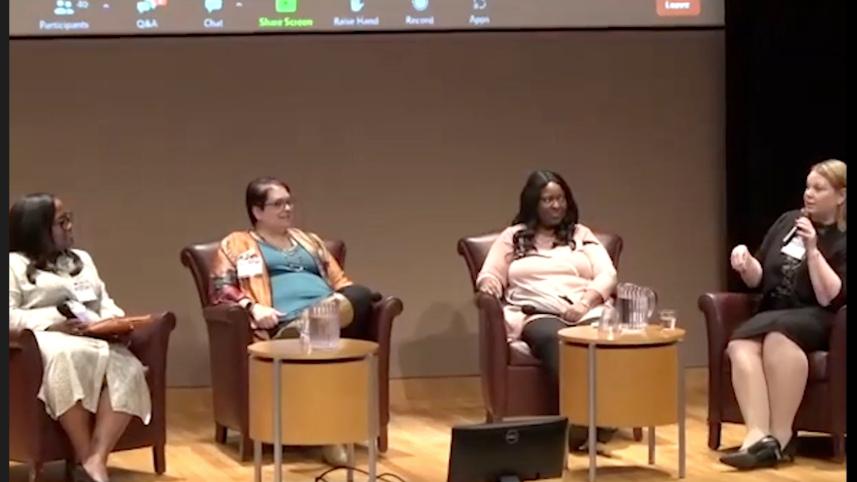
A panel discussion focused on the challenges science teachers face. Photo courtesy of AAAS.
In the second step. we split the audience into three groups, dispatched them to separate makeshift classrooms, and allowed them to experience great science teaching there and then. Two of our staff members, Lin Andrews and Blake Touchet, paired up with four NCSE Teacher Ambassadors — David Amidon, Jennifer Broo, Jeff Grant, and Melissa Lau — to guide these national policymakers through an evolution, climate change, or nature of science lesson, each designed to correct a common misconception. With hands-on activities — rolling dice, measuring skulls, or comparing DNA sequences — the participants learned a lot of science while having a lot of fun.
As a result, there was quite a buzz when the audience reconvened in the auditorium for the third step in our program: a panel discussion of the obstacles facing science teachers. Both Lin Andrews and Melissa Lau participated in the panel, and i think that by the end of the conversation, everyone in the room had a much more nuanced understanding of how dedicated science teachers are and how simply being told to do better doesn’t begin to address the obstacles that stand in the way of great K–12 science education.
I hope that NCSE’s moment in the sun in the nation’s capital helped these policymakers understand what we need to do to help teachers do better. The extreme decentralization of our education system forestalls any simple national fix, but we offered some examples of programs that could be enacted at the federal level that might help. Funding of professional development to help current teachers improve their classroom techniques could be considerably expanded, for example. Similarly, it would be great for there to be more funding of scholarships for college students willing to double-major in a science discipline and education, and also provide these students with the opportunity to be mentored by a master teacher during their first few years of teaching — a practice that has been demonstrated to improve both teaching skill and retention in the field.
While organizing this session, I was vividly reminded of how rarely teachers are actually at the table when decisions about education are being made. It’s not hard to understand why — they’re busy teaching! (Taking time away from the classroom is challenging: there’s a lot of material to cover in a school year and it’s a lot of extra work to prepare a substitute so that the students don’t fall behind.) But I hope that by bringing such a stellar group of teachers (not to mention our own staff members, who only recently left the classroom) to Washington DC, NCSE will have convinced a lot of national policymakers that it’s time to move beyond the idea that the problem with science education is the teachers and instead embrace the notion that teachers are a big part of the solution.


